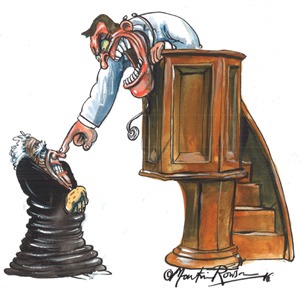I'm standing with friends in a cellar bar on a Friday night, listening to a band playing cajun-style music. The band is in good form, and the crowd in a weekend mood. The set ends with cheers and applause. Then the DJ goes into action. The sound-system is turned up several notches and pop floods the room, so loud that conversation becomes impossible. We edge behind a pillar to see if that blocks the sound out, but to little avail; it seems to saturate all the available space, digging right inside your consciousness. The mood is broken; suddenly we feel at bay. I turn to a friend and shout, "it's times like this that make you realise the virtues of silence", but I'm not sure she hears me. I wander upstairs and outside seeking relief. Sound familar? What are the virtues of silence? How are they being put at risk? And why should we care?
The world becomes steadily noisier, with noise pollution a recognised menace of 21st century life. Noise consciousness varies enormously between individuals, however, and can be very subjective the DJ had no problem with the increased sound level (though his headphones may have offered protection from the blare). It has been suggested that amplification is the most anti-social invention of modern times. Even though amplification can be used creatively in rock and jazz, one can see a rationale to the claim. An outdoor rock concert in a stadium several miles away can sound as if it's taking place in my back garden there's no escape. Your neighbours can play music at volumes unheard of even a generation ago, although houses have not evolved to cope with this improved technology. In the city, silence is a threatened species.
Add in the current trend towards a 24/7 society, and it's clear we're heading into an ever noisier future. New York proclaims itself the city that never sleeps, but that is fast becoming the ambition of almost all major cities in the west. Noise is part of the business ethic that drives our culture. The assumption in bars is that loud music increases consumption by drowning out talk. 24-hour opening means an even noisier environment bad news if you live, and sleep, near a pub.
The search for silence becomes an ever more desperate quest, generating flashpoints between those who want more noise and those who don't. A new source of division in our culture, a politics of noise versus a politics of silence. Never forget, noise sells, and in a consumer society that's the bottom line.
For many of us loud, unsought noise is mental torture. But whether this constitutes a moral issue is more problematic. Solitary confinement is a form of mental torture also, largely because of the enforced silence the individual has to endure. Some seek out the desert for its lack of noise and potential for solitary contemplation. Others are happier sitting on a crowded beach, with numerous ghetto-blasters competing for their attention. Each decision is a mixture of aesthetic and psychological considerations, which have their own particular value and can be defended.
Yet if the moral aspect is fuzzy, it's still possible to argue for the virtues of silence and for their preservation in an era scarred by noise pollution. Silence has an interesting and complex cultural history. It has been a deeply significant element in many religions. Quaker meetings are constructed around the notion of a silence deemed to be the proper condition for worship. Trappist monks take a vow of silence to distance themselves from the the world and concentrate the more intensely on their belief. The Trappist monk and poet Thomas Merton believed that, "if we said only what we really meant, we would say very little". Silence for Merton was a source of inspiration. All forms of meditation throughout the world's religions can be regarded as attempts to gain access to this special state, although it's not only the religious who value meditation.
Creative artists are very aware of the power of silence. In music it's an integral aspect of all composition. John Cage's 4 Minutes, 33 Seconds deploys silence to striking effect, since nothing happens over its 'performance' time. Strictly speaking it is the incidental noise that occurs that constitutes the work's content (complete silence being unachievable for human beings), but 4',33" still scores a valid point about the key role of silence in music. Music is as much the organisation of silence as the organisation of sound; the two are symbiotically connected.
Silence is one of the great themes of poetry; a powerful metaphor for divinity, death, and the unknown. Thus for Gerard Manley Hopkins silence leads to an experience of God's perfection: "Elected Silence, sing to me/And beat upon my whorlèd ear,/Pipe me to pastures still and be/The music that I care to hear."
In Ingmar Bergman's The Seventh Seal the protagonist engages in a protracted chess game with death, the most dramatic moments occurring when death remains silent in the face of the knight's anguished questioning. In Laurence Sterne's great comic novel Tristram Shandy death is symbolised by a black page. Death reduces language, and the author, to silence.
We're in danger of creating a world without space for silence's virtues to be appreciated, and that would be a very considerable loss. Thomas Merton notwithstanding, we could usefully discourse more about why silence is becoming such a threatened species, and why it's important to our sense of humanity to resist this trend. Although these days you may have to join me outside the bar to debate the politics of noise.
Stuart Sim is Professor of Critical Theory, University of Sunderland. He is author of Fundamentalist World: The New Dark Age of Dogma (Icon Press)

